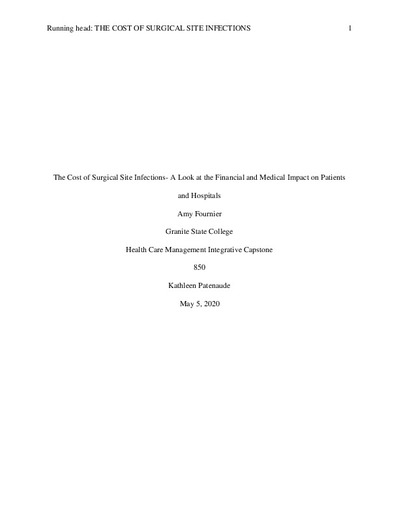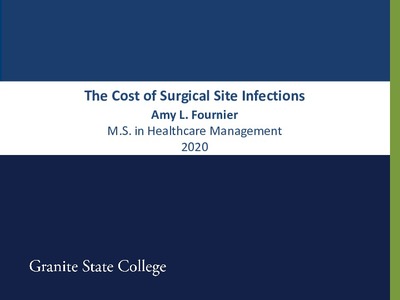The cost of surgical site infections: A look at the financial and medical impact on patients and hospitals
The cost of surgical site infections: A look at the financial and medical impact on patients and hospitals
| dc.contributor.author | Fournier, Amy | |
| dc.date.accessioned | 2022-01-05T14:36:41Z | |
| dc.date.available | 2022-01-05T14:36:41Z | |
| dc.date.semester | Spring 2020 | |
| dc.identifier.uri | https://archives.granite.edu/handle/20.500.12975/371 | |
| dc.description | The aim of this project is to explore the financial and medical impact surgical site infections (SSI) have on the patients and Maine Medical Center. In the United States each year there are an estimated 15 million surgical procedures performed. Moreover, surgical site infections are the leading healthcare acquired infection and cost about $10 billion in direct and indirect costs each year. SSIs also increase morbidity and mortality. The strategy most often used is a bundle, or a group of measures aimed at a specific outcome. The bundle is used by the team to include the patient and all phases of care. In addition to researching current trends, guidelines, a case study analysis was conducted as an exemplar to the devastating affect one surgical site infection can have not only on the patient but the institution. As part of this project, I developed an infection prevention bundle for cardiac surgery. The plan following the project is to implement and monitor the bundle for patient outcomes. In conclusion, although the cardiac division has a low surgical site infection rate (1.19%), one infection is too many. | |
| dc.title | The cost of surgical site infections: A look at the financial and medical impact on patients and hospitals | |
| dc.title | The cost of surgical site infections: A look at the financial and medical impact on patients and hospitals |


